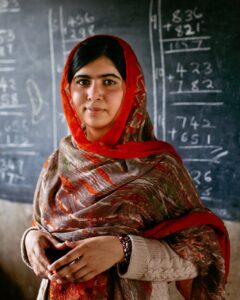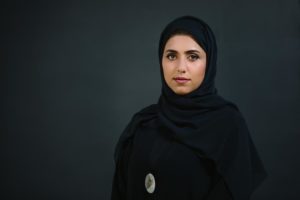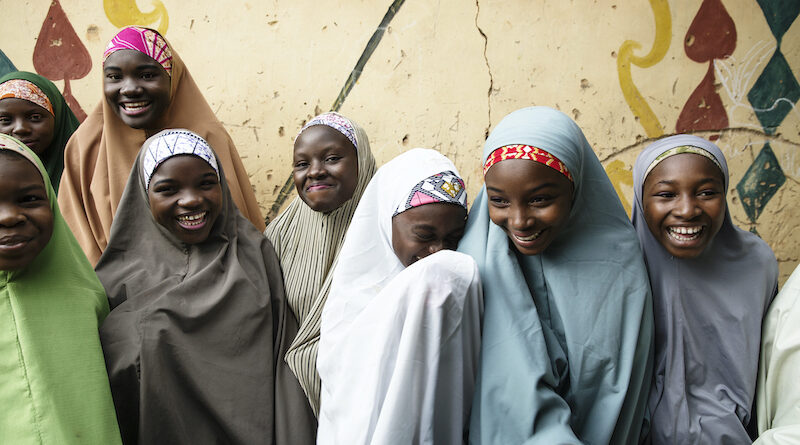Sharjah, November 16th, 2020: Two Sharjah-based non-profits, The Big Heart Foundation (TBHF) and NAMA Women Advancement Establishment (NAMA) have combined their efforts to advocate for the rights of girls and women worldwide, to support a remote learning project in Nigeria benefiting up to 65,000 primary and secondary students, especially girls.
The project’s funding requirement of US $57,781 (AED 212,225.57) was fulfilled by NAMA Fund – a fund established by NAMA to support development projects for women in the Middle East, North Africa and South Asia. The funding was mobilized through TBHF’s Girl Child Fund in partnership Malala fund, co-founded by Nobel laureate Malala Yousafzai.

Malal Yousafzai, Copyrights: c.2012_Tanya Malott
Aimed at boosting the distance learning activities of school students impacted by the closure of schools in the wake of the coronavirus pandemic, the three-month educational project, implemented by ACE Charity, was broadcast via radio, and reached up to 65,000 primary and secondary school goers across five Nigerian states of Abuja, Kaduna, Kano, Borno and Adamawa.
The educational radio programming project sought to ensure that children across Nigeria have timely and sustained access to quality education services during the pandemic. Accordingly, it provided educational resources in reading, writing, and STEM (science, technology, engineering, and math) activities through radio to ensure the dissemination of education to students. Children were also instructed on the vital role of improved hygiene practices, especially frequent handwashing with soap, to curb the spread of the coronavirus and as an essential element for good health.
Specially produced educational content covering the core academic subjects were translated into local dialects and broadcast on radio stations across the five states to ensure the continuity of education during the period of school closures and to increase the likelihood of students – especially girls- returning to schools on reopening.
Catchy radio jingles were aired during off peak periods to attract and draw more children into the educational programme.

Reem BinKaram, Director of NAMA Women Advancement Establishment
Speaking on the success of the project, Reem BinKaram, Director of NAMA, emphasized that it aligns with NAMA’s goals to empower young girls by facilitating inclusive and equitable learning opportunities, in order for them to be able to spur positive social and economic development in their communities
Bin Karam added: “NAMA Women Advancement Establishment is keen to support girls in all societies around the world as the march for advancing women’s equity is a humane global endeavour that will stimulate positive change and is not constrained by geography. Ensuring their continued access to knowledge and skills, especially at a time of unprecedented educational disruption, is definitely a right step in the direction, and will not only allow their personal growth but will also enable communities at large to transition to a more stable, secure future in the post Covid-19 era.”

HE Mariam Al Hammadi
Maryam Al Hammadi, Director of TBHF, said: “TBHF is proud to support a project whose goals were to mitigate the effects of Covid-19 on the education of young children in Nigeria, and ensure that students were not discouraged by current challenges to enroll in schools or continue their education. We identified like-minded partners in the UAE and beyond to collaborate with, and united our efforts to ensure that 65,000 students across Nigeria continue to learn. The targeted radio broadcasts in five different dialects successfully addressed the needs of the widest possible segment of female students in the primary and secondary sections whose learning had been hampered due to school closures.”
“In a crisis like COVID-19, girls and young women are the first to be removed from school and the last to return.” said Malala Yousafzai
Malala Fund states that girls account for 60% of Nigeria’s 10 million out-of-school children, while according to the UNICEF, one in every five of the world’s out-of-school children is in Nigeria. The onset of Covid-19 has further exacerbated the challenges to keep children learning in a country where economic barriers and socio-cultural norms discourage attendance in formal education, especially for girls.
The Big Heart Foundation and Malala Fund had previously joined hands in 2016, with a donation of USD $700,000 to facilitate the establishment of the Shangla School in Pakistan’s Swat valley, capable of hosting 1,000 girls.
Photo courtesy of Malin Fezehai for Malala Fund, Student girls in Nigeria











